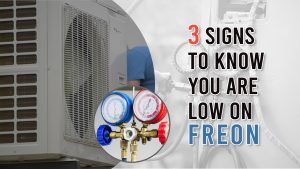Several processes occur for the air conditioning system to cool or heat your house. For a successful cycle, many components are required to function correctly. One such component is the condenser. This unit is responsible for supplying condensed refrigerant from the compressor by heat transfer to cool indoor air. This shows that the refrigerant, or Freon, is a critical component that should always be in top-notch condition.
R-22, R-12, and several others are examples of these refrigerants. Freon is a brand name that acts as an umbrella to these different types of refrigerants. Given the importance of Freon, a leak or contamination will have adverse effects on the AC system. But how can you tell if the AC has leaked off or is tainted?
Why Low Freon Is a Big Problem
As the Freon undergoes cycles between liquid and gaseous states, it should remain at a constant level referred to as the Freon charge. Freon does not get used up, but its level can reduce due to leakages. A low refrigerant charge could be a predecessor to bigger AC problems.
A low Freon charge can lead to compressor damage and overall inefficiencies of the air conditioning unit. This problem happens when the low refrigerant causes freezing on the evaporator coils. Eventually, the ice build-up leads to the insulation of the coils and slows the cooling process. As a result, the compressor uses more effort to compress air, which damages its motor.
Given that the compressor is considered the most crucial component of the AC system, its damage means a setback to air conditioning. However, this doesn’t mean you will need to replace your air conditioning unit entirely. After looking at what causes Freon leaks, we will learn how to prevent compressor damage.
Causes of Refrigerant Leaks

Several problems usually cause freon leaks, and the age of the AC is one of them. As the compressor unit ages, the evaporator coils tend to get rusty on the assembly joints. Subsequently, the coolant will leak when flowing through these coils. Also, a naturally occurring acid called formic develops on the coils’ outer surface, thereby destroying the tubing with pinholes. Freon escapes through these pinholes leading to a low Freon charge. Over time, an AC that runs on low Freon will utilize more power, attracting high utility bills.

Signs That Your AC Is Low on Freon
Basic AC troubleshooting skills are necessary to help you diagnose the unit and avoid huge repair costs. Equally, knowing when the Freon is low will help you take the desired action fast and avoid secondary AC problems.
Although not always guaranteed, there are common signs that reveal when the Freon is low or contaminated. Let’s look at them in more detail.
1. Your AC is blowing hot instead of cold air
AC units perform optimally when the required Freon charge is kept constant. If the level drops, cooling will not occur, forcing the air vents to blow room temperature air into the house. Even though several reasons can cause this problem, low Freon largely contributes to it. So, before concluding that it’s due to low Freon, check thermostat settings, air filters, and registers.
2. The coils are frosting over, and you hear dripping
As we saw earlier, low refrigerant causes heat insulation when cold air gets frozen on the condenser coils. This happens because the compressor lacks enough refrigerant to compress, leading to cold refrigerant. The cold Freon attracts moisture which freezes up. The dripping you hear occurs when Freon temperatures rise, and the frozen air starts forming liquid water.
3. Hissing sounds from the refrigerant line
This one is pretty obvious. The hissing sounds are a result of the gaseous Freon escaping the system. These sounds could be low or high depending on your proximity to the system and the leakage level. One on hand, the leaking is confirmed, and, on the other hand, it’s alarming and requires swift action.
How to Handle Freon Leaks
Although approved Freon compounds are not dangerous, they need special handling from certified and experienced HVAC technicians. These specialists will assess the situation and come up with the best cause of action. Remember that Freon is an expensive compound, so you wouldn’t want to take chances. Are you experiencing the above signs? At Anthem Air, we deal with cases like low Freon leaks regularly. Therefore, we have the experience and capability to handle coolant leaks and other AC problems. Contact us, and we will be happy to help you.





